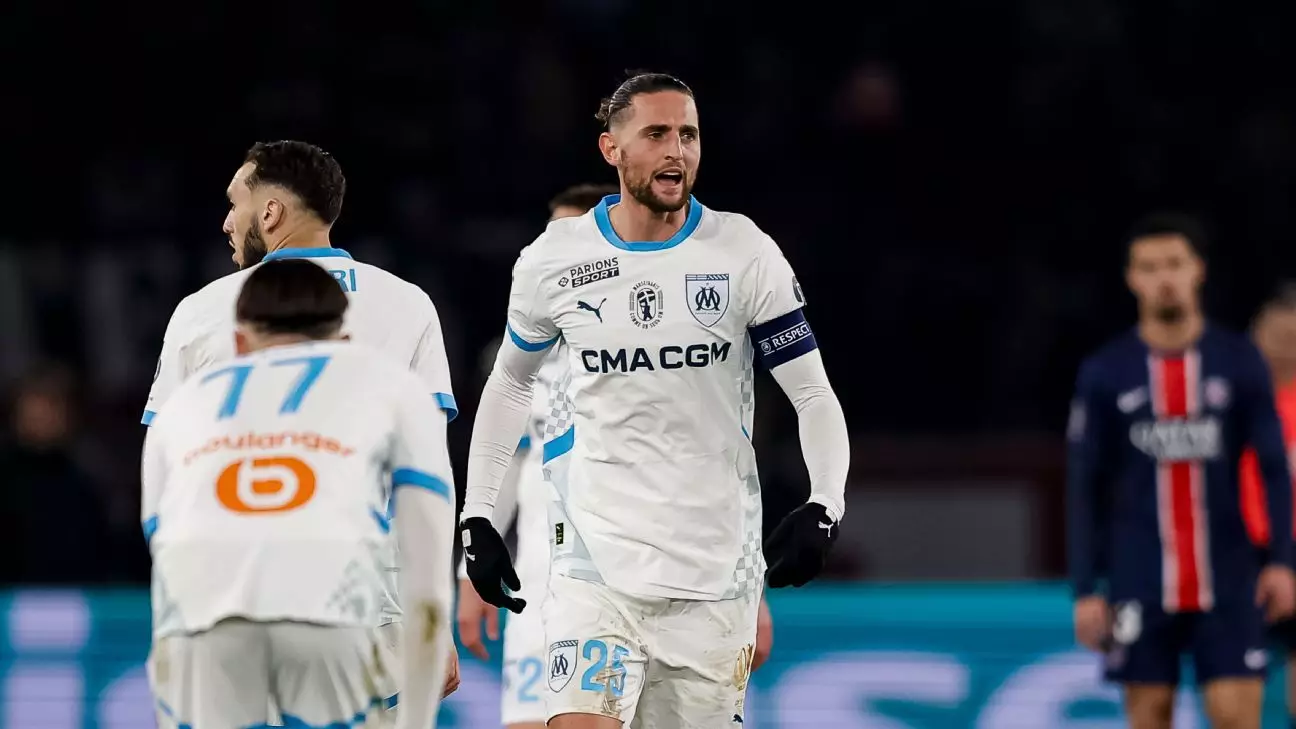The recent showdown between Marseille and Paris Saint-Germain (PSG) was not simply a contest of athletic prowess; it revealed a deeper societal discord simmering beneath the surface of modern football. This match, which ended in a 3-1 victory for the Ligue 1 leaders, became a battleground for discussions about class, sportsmanship, and the rising tide of intolerance in the sport. Marseille midfielder Adrien Rabiot lit the fuse following the match, directing a pointed critique at PSG president Nasser Al-Khelaifi, asserting that “you can’t buy class.” This statement encapsulates not just a personal grievance but highlights a broader philosophical divide within the sport.
Rabiot’s emotional retort strikes a chord, especially when considering the overwhelming wealth at PSG’s disposal post-ownership acquisition. It raises the question: with such financial might, what scorecard do we use to evaluate real success in football? Rabiot’s sentiments resonate, suggesting that integrity and class cannot be purchased, serving as a poignant counter-narrative to the ostentatious displays of power from clubs flush with cash.
Hostility in the Stands
The atmosphere at the Parc des Princes was charged—not solely from the actions on the pitch but also from the toxic environment fostered by extreme factions of football fandom. Anti-gay chanting and various derogatory slurs were not mere footnotes in the match report; they became the haunting backdrop that overshadowed the beautiful game. Rabiot, who returned to PSG after his time at Juventus, faced a torrent of hostile reception from fans. His mother, Véronique Rabiot, announced intentions to file a complaint about the hateful banners directed at her son, further emphasizing that this confrontation is not just a personal one; it is a collective call to scrutinize the culture within football.
Many questioned the inaction of officiating, particularly that of referee Clément Turpin, who opted not to halt the encounter despite witnessing egregious examples of bigotry. This raises critical questions about the consistency in enforcing the regulations aimed at curbing discrimination.
Racism and Homophobia in Football: The Unraveling Silence
The chants from PSG fans, which negatively stereotyped Marseille as “rats”—a phrase steeped in derogatory connotations—exposed a deeply entrenched culture of racism and homophobia in French football. The ease with which fans slip into these forms of expression signals a troubling acceptance that has existed unchanged for too long. Despite historical efforts from the Ligue 1 authorities to take a stand—the introduction of reporting mechanisms for offensive behavior—much remains unchecked. The recent call by the campaign group Rouge Direct for authorities to impose stricter penalties serves as a clarion call for change.
The league’s disciplinary actions to curb this behavior through fines and stadium closures have proven ineffective in deterring such actions, as fans continue to utilize sports culture as a vehicle for their biases. The systemic neglect of these behaviors by club officials and referees not only normalizes discrimination but allows it to fester within the sport.
Enduring Trends: Is Progress Possible?
Despite numerous societal shifts calling for inclusivity and respect, many football clubs, including renowned entities like PSG and Marseille, still struggle with the dark side of their passionate fan bases. The emergence of social media further complicates matters. While it provides a platform for athletes like Rabiot to voice their frustrations, it also enables hate to spread like wildfire.
The challenge now lies not in mere acknowledgment of the problem but the implementation of a structural overhaul. Stakeholders at every level—club management, league officials, and governing bodies—must confront these issues head-on and hold those culpable. The persistent hope for change lies in a united front battling the old guard of intolerance and resentment within what’s supposed to be the beautiful game.
It remains incumbent on sports leaders to facilitate an environment where respect takes precedence over hostility. In a sport intertwined with national identity, heritage, and community, it is a test of moral fortitude that transcends the match itself.


Leave a Reply